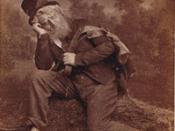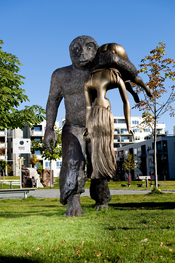What We Can Learn from Henrik Ibsen's Peer Gynt We are afraid to acknowledge our desires because society frowns upon those who let them run amok. Peer Gynt allows us to confront our own dark sides and hidden desires.
At some time in their lives everyone has wanted to do something completely off-the-wall. Only the fear of what people will say stops them from going out and wreaking havoc. Peer Gynt has none of these inhibitions. Overhearing two women gossiping about him, he thinks for a moment and shrugs it off.
In our society placing your mother on the roof and leaving her to fate is unthinkable. Peer does this after they have an argument. With her curses and complaints ringing in his ears he sets off for a wedding. In doing this he flouts society's conventions and morals. While we consciously denounce him for his cruelty, somewhere deep in our subconscious there is jealousy.
We are jealous of Peer Gynt because we see our own dark side projected onto his actions. Nobody can honestly say they've never wanted to put their mother somewhere far away after an argument. We see the similarity between what he does and what we wish we could do.
Peer allows us to confront our envy much like he confronts himself and his sordid life when he meets the Button Moulder. He is told that his life, his very soul, is worthless. The only thing he's good for is spare parts. The whole package is of no value. For him it's frightening that his entire life he has lived for nobody but himself. Not once in his life has he done anything for anybody.
After this we cease to be jealous. His dark side has overtaken him, and death should be a welcome respite from his worthless life. Now he is only an example of how we don't want our kids to act. We are secure in our moral lives and pity poor Peer Gynt who was too weak. While he reveled in his utter lack of consideration for society we were jealous. Deep down we wanted to have that attitude and be free of its restraints.
We will never fulfill our darkest wishes and desires. Society's morals and beliefs are too deeply ingrained for us to completely abolish them. Peer Gynt serves only as a window for what we would be like if there were no restraints or rules. Everyone would live only for themselves. There would be no "random acts of kindness"ÃÂ such as when the bride's parents help Ase search for him. The world would be a much meaner, darker place.
Peer Gynt gives us a glimpse of our dark side. It's something that we are afraid to confront, but we must in order to maintain a peaceful society. To preserve a solid society, we must first experience the worst. If we don't, there is no point to improve from. At the same time we still need those rare people who care nothing about morals or society, because they remind us of why there are rules and common courtesies - without those simple things life would not be worth living. We would all be living to die and be used for "spare parts"ÃÂ.





